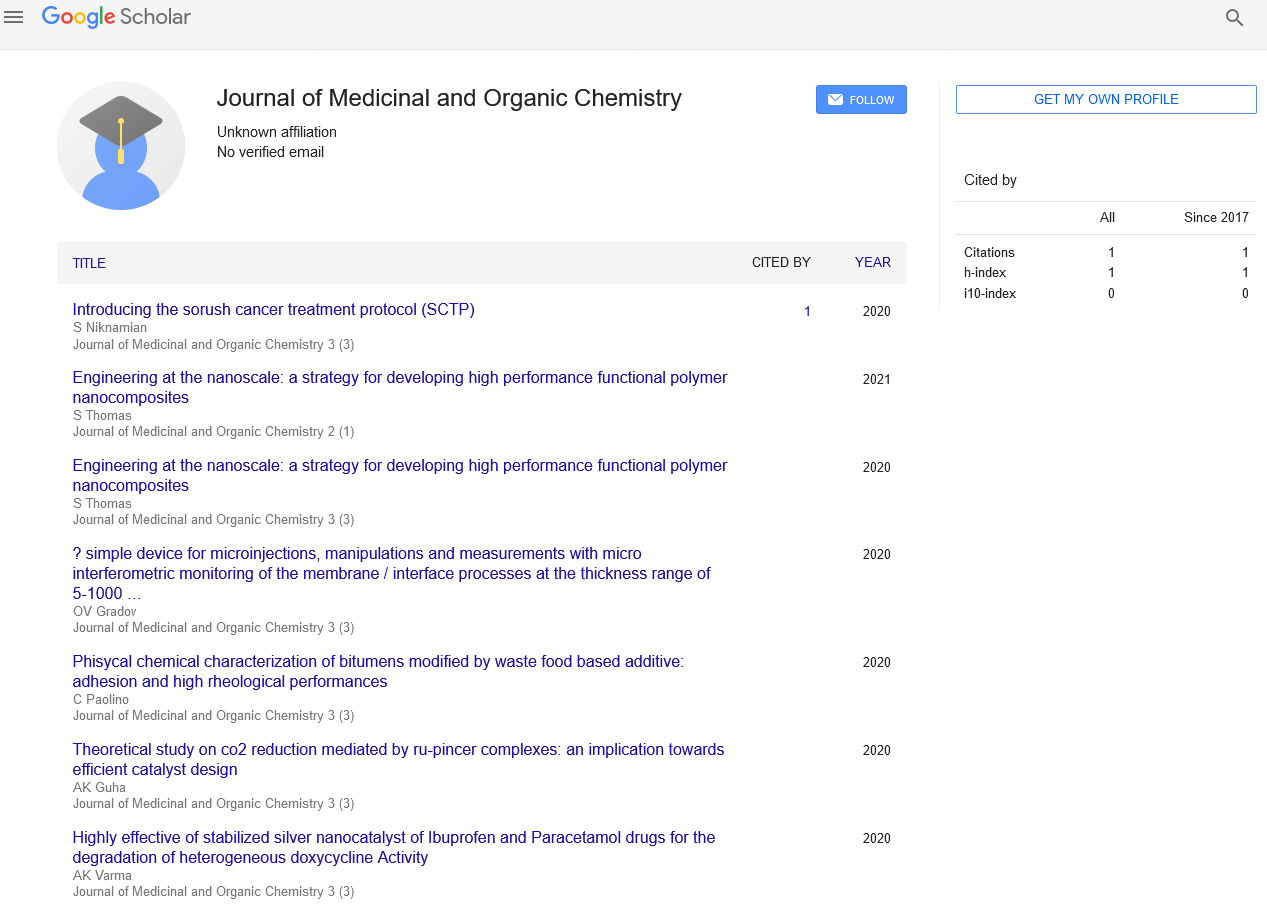Perspective - Journal of Medicinal and Organic Chemistry (2023) Volume 6, Issue 6
Transforming Lives: The Ever-Evolving Landscape of Healthcare Services
- Corresponding Author:
- Yupeng Zhan
Department of Hospital Management,
Bieu Xu lee University,
China
E-mail: zhanyp@hrbmu.edu.cn
Received: 15-Nov-2023, Manuscript No. jmoc-23-121599; Editor assigned: 21-Nov-2023, PreQC No. jmoc-23-121599 (PQ); Reviewed: 06-Dec-2023, QC No. jmoc-23-121599; Revised: 13-Dec-2023, Manuscript No. jmoc-23-121599 (R); Published: 29-Dec-2023, DOI: 10.37532/jmoc.2023.6(6).157-158
Introduction
In the intricate tapestry of human existence, the realm of healthcare services emerges as a cornerstone, embodying the commitment to nurture and safeguard the well-being of individuals and communities. The landscape of healthcare services is dynamic, marked by continual evolution, technological advancements and a growing emphasis on patient-centered care. This article delves into the multifaceted world of healthcare services, exploring the pivotal components that define quality care, the challenges faced by healthcare systems, and the transformative power of innovation in shaping the future of healthcare.
Description
Defining healthcare services
Healthcare services encompass a broad spectrum of interventions, ranging from preventive and diagnostic measures to treatment and rehabilitation. The World Health Organization (WHO) defines health services as “all services dealing with the diagnosis and treatment of disease or the promotion, maintenance and restoration of health.” The provision of healthcare services is not only a medical endeavor but a holistic approach that recognizes the interconnectedness of physical, mental and social well-being.
Preventive services: Preventive healthcare services focus on averting illness and promoting wellness. This includes vaccinations, screenings and lifestyle interventions aimed at reducing the risk of diseases.
Diagnostic services: Timely and accurate diagnosis is foundational to effective healthcare. Diagnostic services encompass a range of tests, imaging and laboratory procedures that aid in identifying health conditions.
Treatment and therapeutic services: Treatment services involve medical interventions to address health issues, ranging from medications and surgeries to rehabilitative therapies. These services aim to alleviate symptoms, cure diseases or manage chronic conditions.
Rehabilitation services: Rehabilitation is an integral aspect of healthcare, helping individuals recover and regain functionality after illness, injury or surgery. Physical therapy, occupational therapy and counseling are examples of rehabilitation services.
Key components of quality healthcare services
Patient-centered care: The shift towards patient-centered care underscores the importance of involving patients in their healthcare decisions. Patient-centered care respects individual preferences, values and needs, fostering a collaborative partnership between healthcare providers and patients.
Accessibility and equity: Quality healthcare services should be accessible to all, irrespective of socio-economic status, geographic location or cultural background. Ensuring equitable access is crucial for addressing health disparities and promoting inclusive healthcare.
Safety and quality assurance: Patient safety is a non-negotiable aspect of quality healthcare. Continuous quality improvement, adherence to evidence-based practices and stringent safety measures contribute to the assurance of highquality care.
Efficiency and timeliness: Efficiency in healthcare delivery ensures that services are provided promptly, minimizing waiting times and optimizing resource utilization. Timeliness in healthcare is critical for preventing the progression of diseases and improving health outcomes.
Challenges in healthcare services
Resource constraints: Many healthcare systems face challenges related to limited resources, including shortages of healthcare professionals, inadequate infrastructure and financial constraints. These challenges can impede the delivery of timely and comprehensive care.
Health inequities: Disparities in health outcomes persist globally, reflecting social, economic and cultural factors. Addressing health inequities requires a multi-faceted approach that considers the broader determinants of health, including education, employment and living conditions.
Innovation and technological advancements
Telehealth and digital health solutions: The integration of telehealth services and digital health solutions has transformed healthcare delivery. Telehealth enables remote consultations, monitoring and access to medical information, improving healthcare accessibility and convenience.
Artificial intelligence in diagnostics: The application of Artificial Intelligence (AI) in healthcare has enhanced diagnostic capabilities, enabling more accurate and rapid interpretation of medical imaging, pathology slides and genetic data.
The future of healthcare services
Personalized medicine: The era of personalized medicine is dawning, tailoring healthcare interventions based on individual genetic, lifestyle and environmental factors. Precision medicine holds the potential to optimize treatment outcomes and minimize adverse effects.
Community-based and preventive care: Emphasizing community-based and preventive care models is a key aspect of the future of healthcare. By addressing social determinants of health and promoting wellness, healthcare systems can reduce the burden of preventable diseases.
Conclusion
Healthcare services, in their essence, represent the embodiment of a society’s commitment to the well-being of its members. As we traverse the evolving landscape of healthcare, the emphasis on patient-centered care, accessibility, safety and innovation becomes increasingly crucial. Challenges such as resource constraints and health inequities compel healthcare systems to adopt innovative solutions and advocate for policies that prioritize health for all. In the tapestry of human existence, healthcare services are not merely a response to illness; they are a transformative force that has the potential to uplift individuals, families and entire communities. As we envision the future of healthcare, the principles of equity, compassion and innovation will continue to guide us towards a world where high-quality healthcare is a universal right a force that not only treats ailments but nurtures the holistic well-being of individuals, fostering a society that thrives on the foundation of good health.

